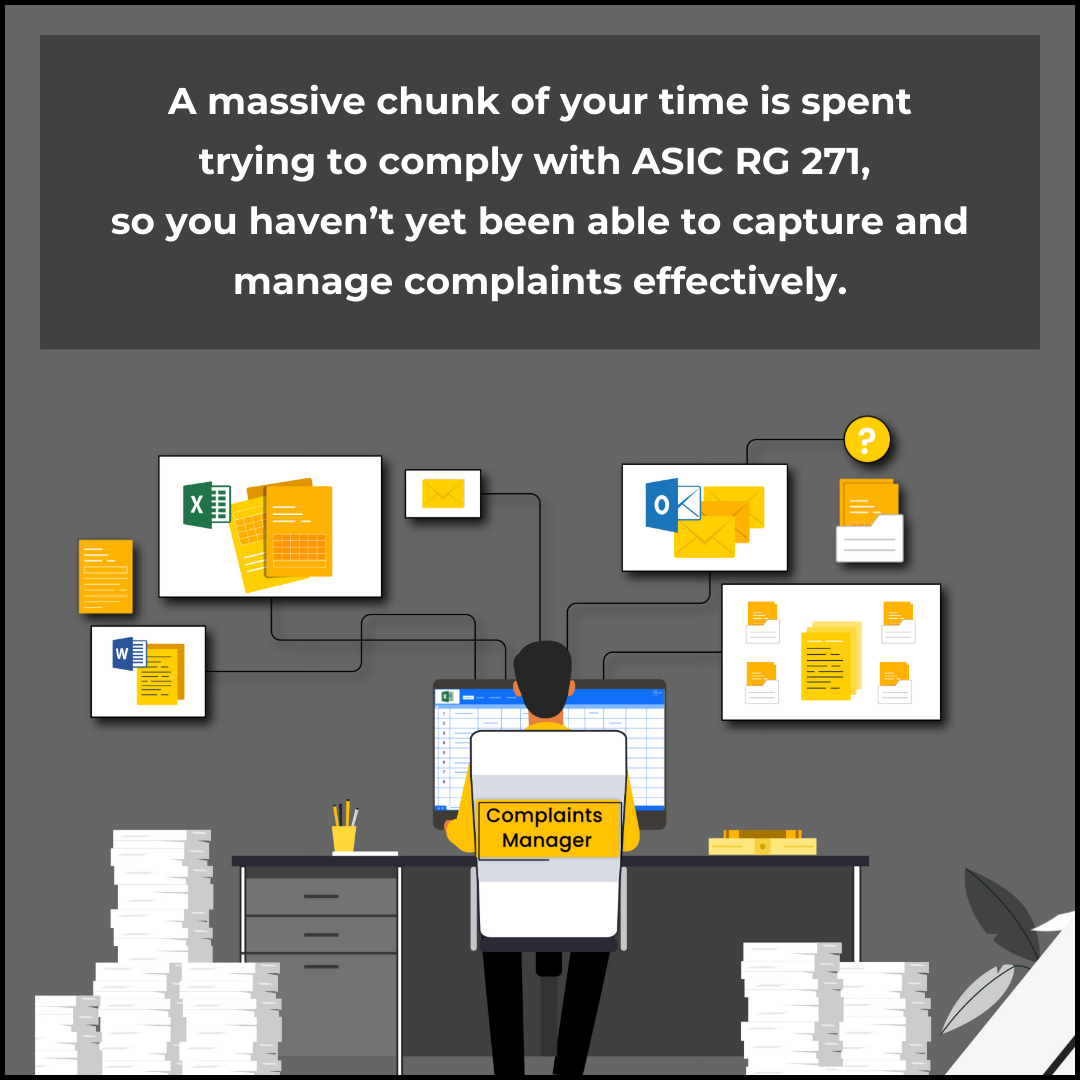Are you leading the complaints, risk, or compliance department for an organisation in the financial services industry? Then you'll probably be aware ...
ASIC RG 271 has recently hit the industry hard.
You are not alone in feeling frustrated.
Let’s take a deep dive into the issues we're seeing in the industry due to RG 271 and the task of managing above-board complaints. Our aim is to show you - you are not alone. These concerns are industry-wide.
Sticking to RG 271 rules is crucial to avoid hefty penalties
You are periodically audited by ASIC, and if breaches of RG 271 are identified, the directors of your company can be personally fined up to $11 million.
Scary stuff.
So, we're guessing that to stay compliant, you’ve made complex changes to your current complaints management process - leading to unexpected inefficiencies.
Ultimately, it’s costly to throw time, staff, training, and resources at your Frontline and IDR teams.
And managing complaints is not a core revenue-generating area of your business - so your current system is not sustainable in the long term. Right?
.png?width=1080&height=1080&name=A%20massive%20chunk%20of%20your%20time%20is%20spent%20trying%20to%20comply%20with%20ASIC%20RG%20271%2c%20so%20you%20haven%E2%80%99t%20yet%20been%20able%20to%20capture%20and%20manage%20complaints%20effectively.%20(3).png)
You’re wasting time capturing and managing complaints, instead of providing a 5-star service
A massive chunk of your time is probably spent complying with ASIC RG 271. But often that impedes Complaints teams from being able to record and manage complaints properly, to the benefit of your customers.
Plus, with the new information that must be captured due to RG 271, your forms and processes have likely become:
- Longer
- More confusing, and
- A training complexity for new staff to become familiar with.
Generating that ASIC IDR Report for RG 271 compliance is complex
Right now, to generate the report, your team probably needs to do a bucket-load of admin work:
Extracting data, cross-referencing, and adding and removing info are taxing manual processes. Phew!
Spending time, money, and labour on generating this report isn’t sustainable and is far too costly. And after all that, you still can’t guarantee that you’ll be compliant!
This entire process is time-consuming, error-prone, and breaks the audit trail. When you inevitably get audited, ASIC may find a discrepancy between your report and a complaint record and you’ll be in breach.
If this sounds familiar - keep in mind, that you're not alone. These are industry-wide concerns ...
BUT - there is a way to combat these real-world concerns.
.png?width=1080&height=1080&name=A%20massive%20chunk%20of%20your%20time%20is%20spent%20trying%20to%20comply%20with%20ASIC%20RG%20271%2c%20so%20you%20haven%E2%80%99t%20yet%20been%20able%20to%20capture%20and%20manage%20complaints%20effectively.%20(4).png)
Implementing a system to manage RG 271 seems like it will take 6 - 12 months!
Like most financial services software implementation processes, you're probably expecting a 6-12 month process for implementing a new Complaints Management software. But the discovery process is taxing. Evaluating offerings, making decisions and implementing changes takes so much time you don't really have to spare.
We get it.
You don't have that amount of hours or bandwidth. And you’re not a lawyer, so understanding and interpreting RG 271 is daunting. But at the end of the day, Complaints Management processes are your responsibility. So the task of implementing ASIC's rules is solely dependent on your understanding of RG 271.
Whilst you might be compliant right now... What happens when ASIC RG 271 is updated?
Your team will have to re-learn ASIC RG 271 rules all over again. Not to mention the extra money, time, and resources fixing your current system to guarantee it’s up to date.
Perhaps your frontline forms haven't received any love and they are already complex. When you even add more information, the forms will become more intricate.
The forms are starting to turn into a hot mess.
You need to produce insightful periodic Complaint Management reporting
Producing basic reports for execs and department managers has become complex with the introduction of RG 271. These tasks take away stacks of your staff’s precious time.
Spending hours rushing to compile a report to tick the ASIC box ends up taking precedence over your customer's needs.
Also, there’s no single source of truth for all complaints across your entire organisation. The company has different departments, all with their own complaints systems and processes.
Wouldn't it be fantastic to declutter the complaints process for your entire organisation? And - at the same time - KNOW that you were compliant at all times ...
Complaints Pro Guarantees 100% Compliance With RG 271. Our Platform is Out of the Box and Implemented in Less Than Three Months
OK, let's lighten the tone.
If you’re reading this, you’ve probably heard online about our enterprise software, Complaints Pro. Our software is the first Australian financial services-specific complaints, quality and compliance platform. Plus, our platform is powered by Salesforce.
The software is easy to use, quick to put in place and requires minimal staff training.
The biggest plus?
Complaints Pro brings much-needed efficiency and clarity to your RG 271 compliance processes.
Causia has 20 years of experience in complaints management best-practice. And we've been focused on providing RG 271 expertise to our clients right since it first came on the radar.
If you’d like to learn more about how Complaints Pro works and how it is helping your peers in the financial services industry, watch the video below.
Is it time to get RG 271 handled?
So, Complaints Managers and financial services leaders - we hope that helps you realise that you are not alone in staying in compliance with RG 271.
A lot of movement is happening in the industry right now with RG 271, and it can take plenty of time and effort to navigate.
We’ve seen the struggles first-hand. That's why we developed Complaints Pro.
Reach out if you need help in staying compliant with RG 271. Or check out more information on this page:
[Complaints Pro For Financial Services - CLICK HERE]
Speak To An RG 271 Expert
In a quick conversation, we'll discuss your approach to managing RG 271, show you how that compares to other similar Financial Services companies, and demonstrate how Complaints Pro will streamline your processes.


